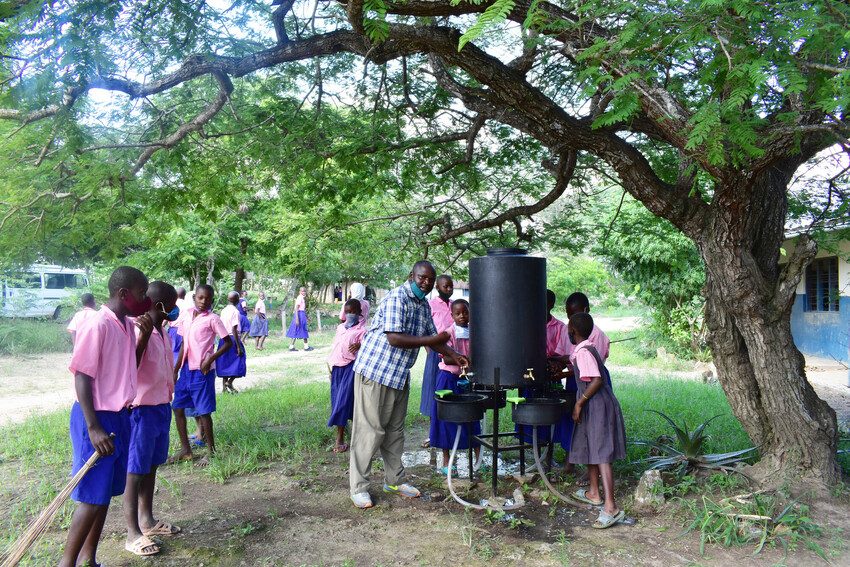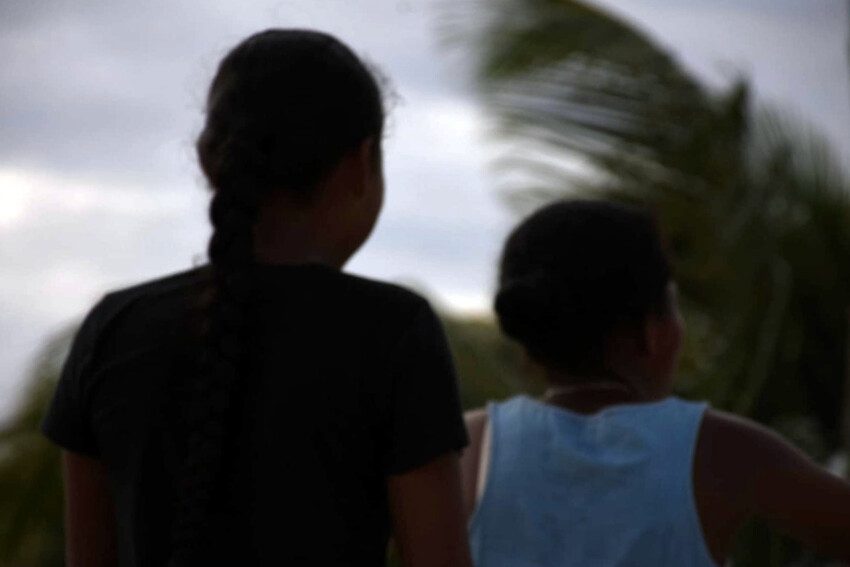The value of water for girls
This World Water Day, we reflect on the value of water in tackling COVID-19, keeping girls safe, helping children keep up with vital education and allowing young people across the globe to continue their lives despite the changing world.
Keeping girls in school in Kenya
In Kenya, schools officially reopened on 4 January having been closed since March 2020 to contain the COVID-19 outbreak. However, many parents kept their children out of school for fear they would not be protected from COVID-19.

To support the safe return of children to schools in the Kwale area, Plan International distributed 60 handwashing stations to 30 primary schools in the county. Each school received a 200-litre water container, hand washing equipment and 20 litres of liquid detergent soap.
“The handwashing kits we have received from Plan International will go a long way in easing the pressure from our parents,” explains headteacher Sura Abdalla.
As well as the handwashing kits, murals featuring COVID-19 safety advice and child protection messages have been painted in all 30 schools.
“The educational murals on our school walls pass on some very important messages to us. I like them. During break time we stand by the wall and our class teacher speaks further about their meaning. We have learnt a lot from the murals and messages,” says Juma, a student at one of the primary schools.
Plan International will continue to support the safe return of all children to the classroom and is following Kenya’s ‘return to school’ policy for teenage mothers and pregnant girls to encourage all the girls and young women who have dropped out of school to return so they can access all the opportunities available to them.
The handwashing kits we have received from Plan International will go a long way in easing the pressure from our parents.
Headteacher sura abdalla
Helping girls stay safe in Azraq refugee camp, Jordan
Sisters Fatima (pictured in black), 15, and Yara (in dark red), 14, have lived in Azraq refugee camp in Jordan since 2016. Before the pandemic they used to go to school but now they have to spend most of their time indoors.
As part of a family of eight living in a small house, they have found this difficult. “Every day is the same – wake up, do some house chores, help mom with the cooking and so,” they explain. “We are a big family, being home all day in a small house just isn’t nice.”
Helping girls manage their periods in Nicaragua

13-year-old Angie* and her family have been living in a temporary shelter in a school after her home in Nicaragua was destroyed by Hurricane Eta. Her town has been left devastated after two deadly storms struck Central America in quick succession in November, leaving hundreds of thousands homeless. Angie, 13, and her family have been living in a temporary shelter since Hurricane Eta devastated their home.
The shelters lack adequate water, toilet and sleeping facilities, leaving children without private spaces to wash, sleep and play. “When we have our periods, it is difficult to wash ourselves, since boys and adults are always spying, and there are no sanitary pads.”
“Menstrual hygiene is a very important issue since, due to gender norms and inequalities, many girls suffer humiliation or mistreatment during their periods and the lack of basic water and sanitation services can increase risks to their health,” says Plan International Programme Manager, Pedro Pérez.
Plan International is working in Guatemala, Honduras and Nicaragua to strengthen child protection in shelters, including training children and their families on how to prevent sexual abuse and report any type of violence.
Many girls suffer humiliation or mistreatment during their periods and the lack of basic water and sanitation services can increase risks to their health.
Angie
Since the hurricanes, Plan International has provided food to more than 24,000 people, and reached more than 16,000 with clean water, hygiene kits and menstrual hygiene kits for girls and women and is also carrying out training on how to prevent COVID-19.
Helping children feel protected at school in Indonesia
After an eight-month closure, schools in Indonesia are starting to reopen in low-risk areas. For many students, being at home has been hard.
“I feel uncomfortable studying from home,” says 13-year-old Angelina.
“I’m happy to be back at school and have mixed feelings of joy and excitement.”
To support children returning to school on the island of Lembata, Plan International has worked together with the government and school authorities to implement hygiene measures to ensure students stay safe.
Angelina, who is part of our sponsorship programme, tells us all the precautions that are now in place have made her feel safe at school.
“I get my temperature checked and wash my hands carefully with soap and water before the beginning of class and I’m okay with that. Thanks to Plan International, I have a nice face mask and face shield. My schoolbag, table and chair are also sprayed with disinfectant before the class begins. I’m not worried any more as I feel protected wearing these devices.”
The value of water during COVID-19
This year, of all years, it’s easy to see how much we must appreciate the value of clean, accessible water in keeping girls, children and families safe as we continue to battle the COVID-19 pandemic.
* Name changed to protect identity


